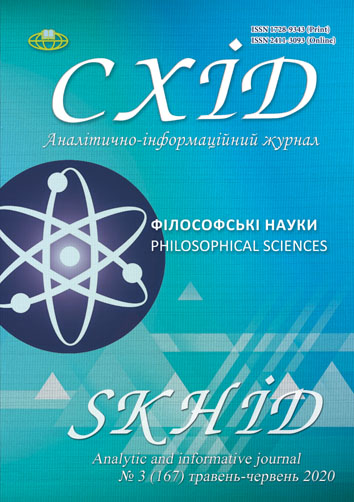Socio-cultural determinants of Malaysia and Singapore innovative development
DOI:
https://doi.org/10.21847/1728-9343.2020.3(167).206739Keywords:
innovative society, Malaysia, Singapore, socio-philosophical analysis, socio-cultural mechanisms of innovative development, East Asian socio-cultural landscapeAbstract
Nowadays, socio-cultural dynamics brings to the fore the question of the ability of national societies to ensure the actualization of their innovation potential. This article attempts to identify the socio-cultural determinants of innovative development in Malaysia and Singapore. As of today, the socio-philosophical discourse has not accumulated sufficiently comprehensive generalizations about the socio-cultural mechanisms for ensuring the innovative development of societies in Malaysia and Singapore. The socio-philosophical generalization of the progress on the innovative development of these two societies, proposed in t–he framework of policy, economic, educational discourses, was carried out. As a research methodology, the approaches of cultural and religious studies were used to analyze the socio-cultural context of innovative development of the studied societies, as well as classical and modern approaches of the theories of post-industrial (information, knowledge) societies. There is reason to believe that the innovative society of East Asian countries, such as Singapore and Malaysia, is approaching in its development to a qualitatively new period, characterized by a paradigm shift in the role of information and ICT in all spheres of public life. It was possible to substantiate the thesis that the paradigmatic shift to the information society of a new model, namely the innovation society, in Malaysia and Singapore is an accentuation of the intellectual component of information. In particular, it is demonstrated that the structural organization of integrity, both at the level of society of these states and the level of individual institutions, acquires the characteristics of rhizomorphism, networking to change the hierarchy and rigid management vertical. It has been demonstrated that Malaysia and Singapore’s public governance strategies, such as government programs or large-scale business projects, often based on the principles of integrativeness, complementarity, and interchangeability.Downloads
References
Brooker, Daniel (2012). “Build it and they will come”? A critical examination of utopian planning practices and their socio-spatial impacts in Malaysia’s “intelligent city”. Asian Geographer, Volume 29, Issue 1: 39-56. DOI: https://doi.org/10.1080/10225706.2012.659192
Genus, Audleay, and Mohd Ali, Mohamad Nor (2007). Bridging the Digital Divide in Malaysia: An Empirical Analysis of Technological Transformation and Implications for E-development. Asia Pacific Business Review, Volume 13, Issue 1: 95-112. DOI: https://doi.org/10.1080/13602380601010573
Gomez, Edmund Terence (2009). The Rise and Fall of Capital: Corporate Malaysia in Historical Perspective. Journal of Contemporary Asia, Volume 39, Issue 3: 345-381. DOI: https://doi.org/10.1080/00472330902944404
Mohan, Avvari V. (2017). Human resource management and coordination for innovation activities: gleanings from Malaysian cases. Asian Journal of Technology Innovation, Volume 25, Issue 2: 246-267. DOI: https://doi.org/10.1080/19761597.2017.1388596
Pereira, Alexius A. (2008). Whither the Developmental State? Explaining Singapore’s continued Developmentalism. Third World Quarterly, Volume 29, Issue 6: 1189-1203. https://doi.org/10.1080/01436590802201162
Pereira, Alexius A., and Kiong Chee Tong (2005). Power and developmental regimes in Singapore, China and Malaysia. Global Economic Review. Perspectives on East Asian Economies and Industries, Volume 34, Issue 1: 129-144. DOI: https://doi.org/10.1080/1226508042000328980
Svyrydenko, Denys, and Olena Yatsenko (2018). Dialectics of Nominal and Real Power in the Ukrainian and World Politics. Ukrainian Policymaker, Vol. 2: 33-40. https://doi.org/10.29202/up/2/5
Svyrydenko, Denys, and Wiktor Możgin (2019). The Soft Power of the State as a Dialectic of Contemporary Dependencies in the International Arena. Ukrainian Policymaker, Volume 5: 89-97. DOI: https://doi.org/10.29202/up/5/10
Tee, Pak Ng (2012). The quest for innovation and entrepreneurship in Singapore: strategies and challenges. Globalisation, Societies and Education, Volume 10, Issue 3: 337-349. DOI: https://doi.org/10.1080/14767724.2012.710121
Yun, Hing Ai (1999). The Singapore state takes charge: Strategizing for the new hi‐tech service society. European Planning Studies, Volume 7, Issue 2: 189-205. DOI: https://doi.org/10.1080/09654319908720511
Downloads
Published
How to Cite
Issue
Section
License
Copyright (c) 2020 Weizhen Gao

This work is licensed under a Creative Commons Attribution-NonCommercial-NoDerivatives 4.0 International License.
1. Authors bear responsibility for the accuracy of facts, quotations, numbers and names used.
2. Manuscripts are not sent back.
3. The publisher does not always agree with the authors' opinion.
4. The authors reserve the right to authorship of the work and pass the first publication right of this work to the journal under the terms of a Creative Commons Attribution-NonCommercial-NoDerivatives 4.0 International License. This license allows others to distribute (copy) the published work for non-commercial purposes, provided there is mandatory attribution to its authors and a link to the first publication in our journal.
5. The authors have the right to conclude separate supplement agreements that relate to non-exclusive work distribution in the form in which it has been published by the journal (for example, to upload the work to the online storage of the journal or publish it as part of a monograph), provided that the reference to the first publication of the work in this journal is included.

